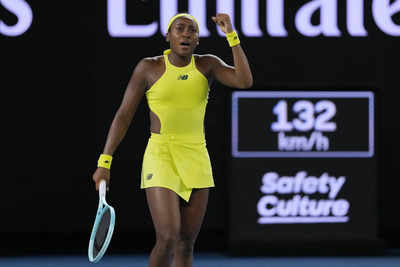CELEBRITY
At Times, Victims Don’t Know They Are Victims: Coco Gauff

The Women’s Tennis Association’s efforts to create a safe environment for players isn’t lost on the leading ladies in the Dubai Duty Free tennis championships, but that awareness is delivered with a coordinating conjunction. While they applauded the WTA’s stand in general they refused to comment on the suspension of Stefano Vukov, coach of Elena Rybakina.
Coco Gauff,the third seed at the WTA 1000 event here, steered clear of Vukov’s oneyear ban because she knew the 25-year-old was unhappy with the Tour’s decision to ban her coach. “It’s nice that the WTA is out there to protect players, I definitely feel protected by them,” the 20-year-old American said, adding the Tour put up contact information on bathroom stalls in lockerrooms around the world, providing an avenue for players to report abuse anonymously.
The 37-year-old Vukov — a former player from Croatia — started working with Rybakina in Febuary 2019. Rybakina, the world No. 7, who opens her campaign here against qualifier Moyuka Uchijima, denied Vukov had ever mistreated he
The Moscow-born Kazakh’s game improved rapidly when she teamed with the Croat, her ranking climbing from 191 to the top-40 in less than a year. Rybakina, who won Wimbledon in 2022, quickly became the talking point in tennis circles, not just for her obvious talent and smooth style of play, but also because of Vukov, whose behavior was obviously out of order. A report in The Athletic noted that Vukov had called Rybakina ‘stupid’, telling her that without him she would ‘still be in Russia picking potatoes
Rybakina, who has struggled with her health, especially in the past year, split with Vukov last August, but rehired him in January adding a twist to an already complicated situation. In between she started working with former Wimbledon champion Goran Ivanisevic, who quit her team after the Australian Open. The Kazakh, who says she’s still getting coached by Vukov on the phone, is also working with Italian Davide Sanguinetti.
“I’m disappointed with the situation, and how the process went,” Rybakina said of the decision to ban Vukov.
Abusive coaches and parents are not new to tennis and the WTA has been quick on the button, famously with Jim Pierce and Damir Dokic, both of who fell in the dads from hell column and faced bans from the Tour.
Gauff said, “That’s important in our sport because a lot of times victims don’t even know they are victims. It has happened so many times in this sport. You see former players speaking out (on abuse) years after their careers ended.”
She added, “It’s a unique sport, you’re 14, 15 and out of the country, most of the time you aren’t traveling with your parents, so anything can happen.”
And sometimes it is the parents who are the problem. Jessica Pegula, the world No. 5, said she didn’t know the details of Rybakina’s case. “I don’t really think I should know,” she said with a shrug, “People nowadays have this feeling that they have a right to someone’s personal life, with social media they (feel) they have the right to know things. The point of safeguarding is to be able to report private information and know your name’s not going to be out there. Maybe for the victim, you don’t want anything coming out that would make them uncomfortable,” Pegula said.










